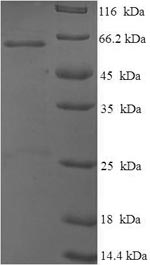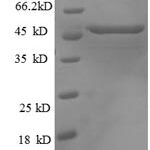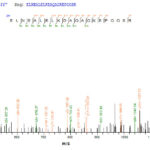Mouse p53 / TP53 Recombinant Protein Product Attributes
Product Type: Recombinant Protein
Recombinant p53 / TP53 based upon sequence from Mouse
Host: QP6823 protein expressed in E. coli.
Tag: His-SUMO
Protein Construction: A DNA sequence encoding the Mus musculus (Mouse) p53 / TP53, was expressed in the hosts and tags indicated. Please select your host/tag option, above.
Recommended Applications: Immunogen, Protein Standard, Cell culture, or Other Cell Biology Applications.
Application Notes: Please contact us for application specific information for QP6823.
Bioactivity Data: Untested
Full Length? Full Length
Expression Region: Met1 – Asp387
Amino Acid Sequence: MEESQSDISL ELPLSQETFS GLWKLLPPED ILPSPHCMDD LLLPQDVEEF FEGPSEALRV SGAPAAQDPV TETPGPVAPA PATPWPLSSF VPSQKTYQGN YGFHLGFLQS GTAKSVMCTY SPPLNKLFCQ LAKTCPVQLW VSATPPAGSR VRAMAIYKKS QHMTEVVRRC PHHERCSDGD GLAPPQHLIR VEGNLYPEYL EDRQTFRHSV VVPYEPPEAG SEYTTIHYKY MCNSSCMGGM NRRPILTIIT LEDSSGNLLG RDSFEVRVCA CPGRDRRTEE ENFRKKEVLC PELPPGSAKR ALPTCTSASP PQKKKPLDGE YFTLKIRGRK RFEMFRELNE ALELKDAHAT EESGDSRAHS SYLKTKKGQS TSRHKKTMVK KVGPDSD
Purity: Greater than 90% as determined by SDS-PAGE.
Reconstitution Instructions: Concentrated protein in liquid format. Reconstitution is not necessary.
Concentration of Mouse p53 / TP53 Protein:
Endotoxin Levels: Not determined.
Buffer: Tris-based buffer, 50% glycerol
Storage Conditions: Store at -20C to -80C.
| Recombinant Mouse p53 / TP53 Protein General Information | |
|---|---|
| Curated Database and Bioinformatic Data | |
| Gene Symbol | TP53 |
| Entrez Gene ID | 22059 |
| Ensemble Gene ID | ENSMUSG00000059552 |
| RefSeq Protein Accession(s) | NP_001120705.1 |
| RefSeq mRNA Accession(s) | NM_001127233.1, NM_011640.3, XM_006533157.3 |
| UniProt ID(s) | P02340 |
| UniGene ID(s) | Mm.222 |
| COSMIC ID Link(s) | TP53 |
| KEGG Gene ID(s) | mmu:22059 |
| General Description of Recombinant Mouse p53 / TP53 Protein. | |
| Acts as a tumor suppressor in many tumor types; induces growth arrest or apoptosis depending on the physiological circumstances and cell type. Involved in cell cycle regulation as a trans-activator that acts to negatively regulate cell division by controlling a set of genes required for this process. One of the activated genes is an inhibitor of cyclin-dependent kinases. Apoptosis induction ses to be mediated either by stimulation of BAX and FAS antigen expression, or by repression of Bcl-2 expression. In cooperation with mitochondrial PPIF is involved in activating oxidative stress-induced necrosis; the function is largely independent of transcription. Prevents CDK7 kinase activity when associated to CAK complex in response to DNA damage, thus stopping cell cycle progression . Induces the transcription of long intergenic non-coding RNA p21 (lincRNA-p21) and lincRNA-Mkln1. LincRNA-p21 participates in TP53-dependent transcriptional repression leading to apoptosis, but ses to have to effect on cell-cycle regulation. Regulates the circadian clock by repressing CLOCK-ARNTL/BMAL1-mediated transcriptional activation of PER2 . | |
Limitations and Performance Guarantee
This is a life science research product (for Research Use Only). This product is guaranteed to work for a period of two years when stored at -70C or colder, and one year when aliquoted and stored at -20C.






There are no reviews yet.